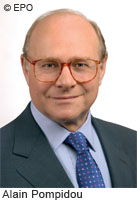London Protocol is stepping stone to Community patent, says EPO
European Patent Office (EPO) President, Professor Alain Pompidou, has said that completion of the London Protocol will be an important move towards a 'Community patent', championed by the European Commission, which could eventually cut costs for patents throughout Europe. This would boost patent uptake by small and medium sized enterprises (SMEs), and would be integral to Europe's overall innovation drive. Professor Pompidou spoke in response to the EPO's public hearing, held on Wednesday 12 July. He said that he believed ratification of the London Protocol by France, the starting-point for cutting the number of languages essential for EPO patents, was imminent. The London Protocol allows signatory countries to submit patents in just three languages - English, French and German. The London Protocol needs a minimum of eight states to ratify, including France, Germany and the UK. To date, 'ten states, including Germany and the UK, have adopted the agreement in parliament, and seven have already deposited their instruments of ratification,' said Professor Pompidou. France has yet to ratify the treaty, but the EPO President said he was 'confident that the French government will take the necessary steps to ratify soon, too'. Translations can account for 20 per cent of the total cost of the European patent. Reducing the number of languages to three could reduce translation costs by around 45 per cent, said Professor Pompidou, up to €3,000 per application. 'The saving to industry would be significant,' he said. The EPO considered 128,000 patent applications in 2005. Making patents cheaper, more accessible and of a higher quality is essential to driving Europe's innovation. While large conglomerates can afford the lengthy and expensive country-to-country patent system, many SMEs cannot, leaving their intellectual property unprotected. As SMEs are often highly innovative, this system could be damaging to Europe's overall growth. 'Of the 34,000 applicants in 2005, nine out of 10 filed between one and five patent applications. Most of these applicants were SMEs,' he said. The bulk of those patents were in areas such as engineering, electronics, chemistry and optics. The EPO also proposes cranking-up the quality of European patents. 'The EPO is concerned that quality should be moved to the centre. There needs to be quality of process, to avoid trivial patents - we need the best legal certainty to approve,' said Professor Pompidou. He proposed a European Quality System to monitor the quality of European patents, which would involve national patent offices. 'The EPO will be open to receive feedback to improve quality and user need,' he said. Further savings could be made if the EPLA (European Patent Litigation Agreement) is made reality. This body would decide on disputes, currently done state-by-state. The EPLA would replace the litigation in place in individual EPO member states - currently 31 nations. 'The EPLA must be submitted to an intergovernmental conference for adoption as soon as possible,' he said. Part of the EPLA system could be an EPLA court. Paris is rumoured to be the first choice for the court. 'This is a political question to be resolved at the end. Paris, Luxembourg and The Hague are all possibilities. This rumour is news to me,' said Wim Van der Eijk, the EPO's principal director for international legal affairs and patent law. The formation of an EPLA could come as soon as the German Presidency of the EU, said Professor Pompidou. The EPO's proposals are currently with the European Commission, which could mandate a diplomatic conference to ratify them rather than going through the European Parliament. In the EU, most SMEs would like to see a Community patent. During the open hearing on 12 July, Maria Cimaglia, Legal Affairs Advisor for UEAPME, the European Association of craft Small and Medium-sized Enterprises, said that a centralised legal system, such as the proposed EPLA, could help SMEs. However, she believes that the language restrictions should go be extended, to further reduce costs, and that a Community patent should be a higher priority: 'we believe that English should be chosen as the official language of the procedure, as it is already the universal language in the field of patents. As an alternative solution, patent applications could be filed in any of the EU languages and the main claims could then be translated into English,' she said. Professor Pompidou stated categorically: 'The EPO is in favour of the Community patent, a relevant, working and cost-efficient Community patent,' he said. He felt it was important not to compromise on the concept, to keep it 'strong'. The drop from 21 to three languages will be an important first step. 'If the London Protocol is adopted, three languages will help pave the way towards a new Community patent. The EPO is in favour, with national offices, to work for a Community patent, if it fulfils innovation need for application in large and small industries,' he said. The EPO grants patents for organisations within states - currently 31 - that have signed the European Patent Convention, which came into force on 7 October 1977. The activities of the EPO are supervised by the Organisation's Administrative Council, composed of delegates from the contracting states. The public hearing on 12 July was designed to guide the EPO's future direction.

